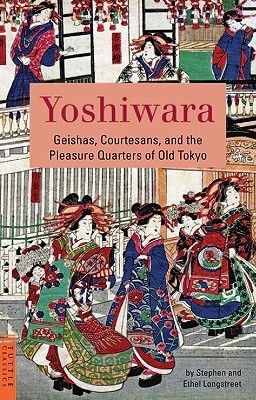Kindle Notes & Highlights
Read between
April 12 - July 3, 2018
the customs of a society that in morals, manners, and sexual patterns differs a great deal from our own—or once did.
(never the East and West shall meet, but in song).
Be prepared for the fact that in Japan there is no sin, Original or otherwise…
if they be forcibly abolished, men of unrighteous principles will become like raveled thread.
“One must create chaos to make a world.”
“One must create chaos to make a world.”
the hot, sulphur water has given the first quietus to ‘prickly heat’
taiko joro (drum whores).
American and European voices praising Western love impressed the geishas and courtesans as merely “the bellowing of animals, the rasping of barbarians,” to quote from a 19th-century letter.
17th century that the term geisha was really established in Edo,
were not by definition prostitutes, and could not compete with the professional courtesans of the Yoshiwara ...
This highlight has been truncated due to consecutive passage length restrictions.
she was and is a trade:
geisha-girls are almost forced, as it were, to commit spiritual suicide, so that it is but natural they abandon themselves to desperation, eventually making themselves like a rudderless boat floating on the wild ocean.
The wife, too, had a text, usually of pictures—a Pillow Book —given to her as a bride.
Nothing is as dangerous as a woman.
High-born ladies broke the bonds— sexually—of the male-dominated home.
The true Madame Butterfly story
Meguro Temple
Buddha had said, “Riches are not an abundance of things or honors, but in the lack of wants.”
“The gods never shut one door that they don’t open another.”
Our own ideas of morality are based on a guilt-ridden puritanical concept of sex. They did not prepare us for the Japanese morality, which consisted of family devotion, respect for ancestors, and loyalty to the God-Emperor. Sexual repression had nothing to do with their morality. A Japanese man was free sexually with no barriers of guilt or moral condemnation.
From the phallic spear of Izanagi fell heavy sperm-like drops that spread and congealed on the waters of the earth as it was then, and became an island in this atmosphere of a god’s prodigality.
In their folklore, the proud, brave Shinto gods would protect the milder Buddha from mean and crafty Japanese demons.
Shinto teaches that the present is the most desirable and splendid of worlds, and that the next world is a foul place, cruel and packed with monumental evil. The Buddhist, however, believes the present existence is a foul thing, cruel and evil, and the next world, if it exists, will be desirable and fine.
The Buddhist believes that the universe has been eternally here and that no creator exists.
What came to the mass of Japanese was a much simplified, much wrung-out Buddhism.
The mass of people still preferred Shinto, as closer to their own sense of themselves.
After rape and civil war in the 12th century, Buddha became universal in Japan. Called Pure Land Buddhism,
The lords and princes and the samurai demanded a more exotic form of Buddhism. For them, Nichiren Buddhism would not do. It was a bit vulgar in its promises to all. They preferred the Zen cult,
the Buddhist belief of the impermanence of all things in this world, of the futility of all human endeavor,
the Japanese gods, as we have described above, given to sexual pleasures, taken in great leisure, were divine masters of the art of fornication).
It is incontrovertible that, in every individual brain is locked up the inherited memory of the absolutely inconceivable multitude of experiences received by all the brains of which it is the descendant.


